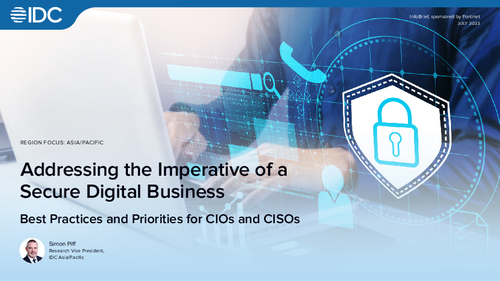Digital Identity , Digital Transformation , Digitization
Digitally Skilled Workers Contribute to Economic Growth: Study
Rapid Digital Transformation in APAC Sees Widening Digital Skills Gap
There is a silver lining to the massive layoffs in the global tech industry. An international survey states that workers who acquire digital skills provide significant economic value to businesses and economies - increasing GDP, revenue, innovation, wages, job security and job satisfaction. The study also found a number of practical hindrances to hiring digital workers, such as the mandatory requirement for bachelor's degrees.
See Also: Endpoint Security Essentials for the C-Suite: An Executive's Digital Dilemma
The "Asia Pacific Digital Skills Study: The Economic Benefits of a Tech-Savvy Workforce," commissioned by AWS and conducted by Gallup, states that the rapid pace of digital transformation in the Asia-Pacific region and technological changes are contributing to a widening digital skills gap. These must be addressed to unlock the region's full economic potential, especially in the face of challenging economic times.
The study surveyed more than 9,000 employers and 30,000 workers with access to the internet in 19 countries - comprising 67% of the total value that jobs requiring advanced digital skills add to the global economy.
The data shows that nearly three-quarters of workers in these countries do not use a computer in their jobs, suggesting there is a significant imperative - and opportunity - to bridge the skills gap between the region's workforce and its business needs.
The study classifies basic digital skills as the ability to use email, word processors, other office productivity software and social media. Intermediate digital skills include drag-and-drop website design, troubleshooting applications and data analysis. Advanced digital skills include cloud architecture or maintenance, software or application development, artificial intelligence and machine learning.
The study shows five key benefits for organizations and employees with advanced digital skills.
- Advanced digital workers earn 65% more than non-digital workers, adding nearly $1 trillion to Asia-Pacific’s annual GDP;
- Workers who use advanced digital skills feel more satisfied and secure in their jobs;
- Employers that rely heavily on advanced digital skills, digital technology and cloud technology report higher levels of revenue, growth and innovation;
- Seven in 10 employers in Asia Pacific countries face digital hiring challenges, in part due to strict bachelor's degree requirements;
- Two-thirds of organizations in the region say they are likely to adopt at least one emerging technology.
Demand for Digital Talent
The COVID-19 pandemic and post-pandemic periods saw organizations accelerating their digital transformation programs. This created a huge demand for advanced digital skills.
The study says governments and industries across the APAC region are grappling with a shortage of digitally skilled talent, and they are struggling to keep up as a result. It suggests they should now upskill and reskill workers with a sense of urgency.
Satyendu Mohanty, executive vice president and global head, digital assurance and competency, Hexaware Technologies, says there are "multiple transformation programs in progress" and "many large deals in the pipeline," which makes creating digital talent a top priority for organizations.
"While there is an overall softening of demand, the demand for digital skills continues to be quite high as the talent upskilling to digital skills hasn’t kept pace with the spike in demand in 2022," Mohanty says.
Hexaware Technologies is a global technology and business process services company. The 30,000-employee company helps its customers with digital transformation at scale by partnering with them to build, modernize, run and optimize their technology and business processes.
Lipika Mohanty, director, people and development, BUSINESSNEXT, says the demand for advanced tech skills increased with accelerated digital transformation. "The challenge will continue in terms of availability if people do not upskill or reskill," she says.
BUSINESSNEXT offers innovative solutions to global banks and financial services companies. The 20-year-old company claims to have over one million users across 65,000 branches and call centers managing 1 billion end customers worldwide. It offers a composable suite of deep tech platform and cloud-agnostic hyper-SaaS solutions.
The study also indicates that organizations who employ advanced digital workers report more than double the annual revenue of basic digital organizations ($1.1 million to about $441,000), in addition to growing and innovating at faster rates.
Across all countries surveyed in APAC, digital workers add an estimated $4.7 trillion to the GDP of the region. Due to their higher prevalence in the workforce, more than half of those gains are from individuals who only use basic digital skills, such as email, word processing and social media at work.
"A digitally skilled workforce helps implement tech-oriented solutions that automate or improve many processes, which brings in efficiency and, therefore, reduces costs," says Anil Salvi, MD and group head, human resources, JM Financial Products Limited.
Emerging Technologies
The report identifies 10 emerging technologies that APAC organizations are likely to adopt: 5G, artificial intelligence/machine learning, edge computing, robotics, quantum computing, augmented reality/virtual reality, metaverse, digital twin, blockchain and digital currency.
About two-thirds (67%) of organizations say at least one of these technologies is likely to become a standard part of their business operations. More than half of employers (56%) believe multiple technologies will become standard, and 17% say all 10 will be part of their organization’s business.
Mohanty of BUSINESSNEXT says they are hiring for tech skills required for AI/ML, cloud technologies, big data analytics and data science. She says these are the technologies that "directly impact" their business.
"We are playing in the higher end of the product value chain. And we are operating with all the current advanced skills that are there in the market: Kubernetes, Docker, React, Node.js, REST API, ML and Angular," BUSINESSNEXT's Mohanty says.
Hexaware is also looking for a variety of digital skills such as AI, machine learning, cloud-native dev, cloud ops, Snowflake, data integration across hyperscalers; IoT and SaaS product technologists.
For JM Financial Products, which offers a suite of customized loan products to corporates, SMEs and individuals, the focus is on cloud computing skills, which includes application servers hosting, cloud data warehousing, analytics, machine learning, API management and storage.
However, it is a challenge to find digital workers with these skills.
Hiring Challenges
Gallup's analysis for this study found a number of obstacles to hiring digital workers, including a notable disconnect between how much employers say they value non-traditional education certifications, such as industry certifications, and their actions when evaluating candidates' resumes.
"A bachelor's degree is a prerequisite for senior roles and the roles that require an advanced level of creative thinking, managerial and strategic thinking.," Salvi says. He also said that the bachelor's degree "is not a strict criterion" while selecting candidates for junior level roles or non-critical roles" and that "authentic digital certifications" are usually considered for those roles.
Steve King, managing director at ISMG's CyberTheory and founding board member at ISMG's CyberEd.io, has a different opinion. He says he is willing to overlook the bachelor's degree in favor of advanced digital skills and certifications, as today's youth are "more mature and digital savvy."
"Way back in the day, a BA or BS gave you four years of social maturity plus some foundational understanding of a field. I think that era has passed. Today's youth, typically between 18 and 22-years old, don't need that college experience to integrate their minds with the larger world, which is also now much smaller," King says.
King gives more importance to education and training, role models and mentoring. He says and this is the reason ISMG launched its learning platform CyberEd.io, which strives to close the education and skills gap in the cybersecurity industry.






















